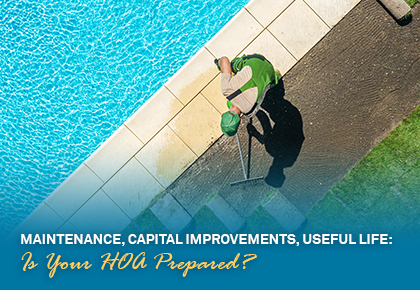Narrow Results
-
A Smooth HOA Management Transition Starts With Good Communication
Most homeowners associations (HOAs) in Nevada are managed by a community management company. So hiring a new management company is a pretty common occurrence in our state. -
Don’t Be the HOA Bad Guy: 4 Proven Policy Enforcement Tips
Enforcing HOA policies is nobody’s cup of tea, but having good policy enforcement in place helps improve the resident experience and elevates your reputation. Follow these 4 principles for healthy policy enforcement: -
HOA Reserve Funds: 6 Tips to Improve Your Returns
Are you really getting the best returns on your reserve funds? Most Nevada board members aren’t sure. Learn six ways to improve your reserve fund returns. -

How to fund HOA capital improvements
Great capital improvements improve property values. Read on to see the three ways to pay for them and the pros and cons. -

Maintenance, Capital Improvements, Useful Life: Is Your HOA Prepared?
Is your maintenance job turning into a capital improvement? Is it possible to extend the “useful life” of a component? Learn more about maintenance, capital improvements and useful life. -
How Does Your Community Rate?
Do you know how your community rates to newer communities? What can you do to change your image? Find out how you can be keep your rating up in this new article by Erin O'Reilly that was featured in Management Trends. -
Email Communication Best Practices for Coronavirus Information
Here are some email communication best practices for your building to use when sending out communications regarding the current pandemic. -
Four Ways to Keep Your Building Safe and Clean
Living in close proximity to other people can come with challenges, especially during cold and flu season. -
Habitat Magazine-Here Are Ways to Pay for Retrofits to Reduce Carbon Emissions
The Climate Mobilization Act, requires buildings 25,000 square feet and larger to reduce greenhouse gas emissions by certain target percentages in 2024, 2030, and beyond. -
Steps for Condo or Co-Op Hoarding Clean Up, NYC
Hoarding can be dangerous to every resident in your NYC condo or co-op building. Learn how to work with hoarders in your building today. -
How to Hold Your Next Board Meeting Through Video Conferencing
It goes without saying that how we communicate has drastically switched from in-person contact to user-friendly digital platforms since the COVID-19 pandemic began to spread. -
Learn How To Achieve Strategic Alignment During A Crisis
It’s important that co-op and condo boards come together to achieve strategic alignment. -
Technology at Home Part 2: Keeping Boards and Residents Safe Online
As board communications become increasingly reliant on web-based technologies, it’s more important than ever to take proactive steps to safeguard the way you share and save sensitive information. -
Technology at Home Part One – Choosing the Best Internet Package
In an effort to help our clients and their families stay safe during these difficult times, FirstService Residential’s in-house technology experts recently assembled a list of best practices and technology tips for working at home, improving password security, identifying potential scams and selecting personalized internet packages. -
Getting Your Building’s Spring Cleaning Started
As building managers begin property inspection, they note the necessary repairs for winter damage as they make their rounds through the community. The spring season is a time for renewal and a fresh look, so being able to properly landscape around the building is of utmost importance. -

How a preventive maintenance plan can prepare your condo for all seasons
Cold weather will soon be upon us, so now is the time to make sure your condominium maintenance program is on track. As brutal as Ontario's winters can be, you certainly don't want to discover a leak in your roof during a heavy snowfall or have a boiler stop working during a record cold spell. -
Saltwater Pools are the Future, and YES, They Have Chlorine!
Saltwater pools offer a variety of benefits ranging from greater comfort for swimmers -- say goodbye to burning eyes and dried out hair -- and also for the environment. This article explores why saltwater pools are gaining popularity in condominiums and communities here in the Greater Toronto area and around the world. -
The Six Secrets to Building Your Condo’s Volunteer Pool
As a board member for your condominium corporation, you know that your community depends on volunteers to operate successfully. However, finding residents who are willing to be on your board of directors, join a committee or help at an event can be challenging. -
Tips For Generating Community Engagement In Your Condominium
What makes a community a great place to live? A lot goes into it, but it’s no secret that often depends on community engagement. -
-
A guide to neighborhood covenants
Managing association covenant enforcement can be difficult in any community. Restrictions for every community can be different, and it can be a challenge to keep the rules fair, reasonable and equally applied to all homeowners. Read on for some basic guidelines that will make navigating through these issues a little easier. -
Can HOA board members be held liable?
If you’ve agreed to serve as a board member for your homeowners association (HOA), you may be thinking this is just like any other simple volunteer opportunity. However, there are certain fiduciary responsibilities and protocols that board members should be aware of to help protect the association and their own personal liability. Here we’ve compiled a few fundamental principles that every board member should apply. -
A guide to Texas hurricane preparation for your HOA
Everything is bigger in Texas & sometimes even hurricanes. And during hurricane season, being a board member for a residential community in the Houston area can bring some big challenges, too. To help get you and your community ready and reduce the effects if a hurricane does strike, we've put together six important tips. -
Condo water damage: Risks, prevention, and more
A leak in a high-rise condominium can quickly result in expensive water damage. How can you reduce your risk and be better prepared if your building springs a leak?